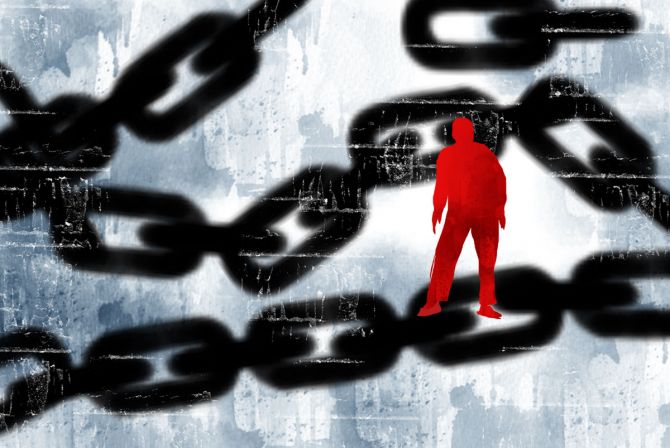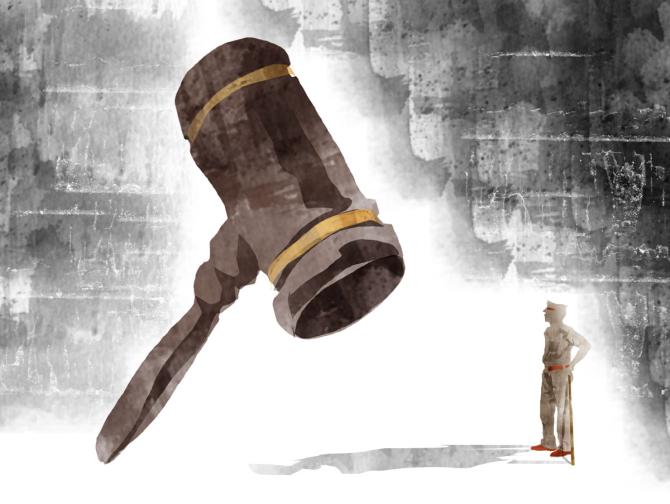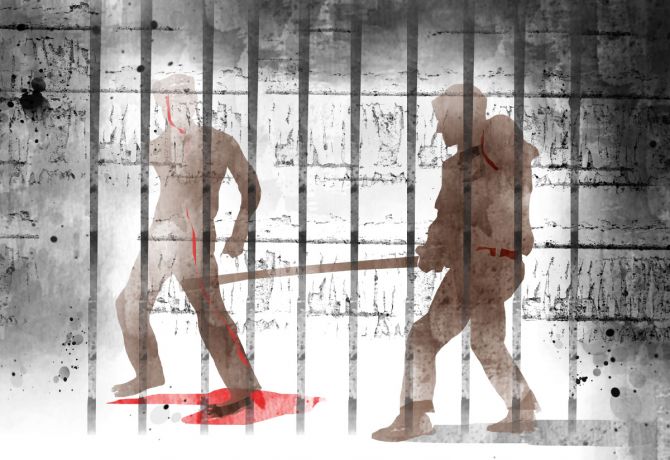'These new laws give complete (impunity) to the police.'
'Whatever little accountability the police had, all that is gone now.'
'There is no accountability mechanism against the police for abusing or misusing in the new laws.'

On Christmas day, President Droupadi Murmu signed the three criminal law bills -- the Bharatiya Nyaya (Second) Sanhita, Bharatiya Nagarik Suraksha (Second) Sanhita and Bharatiya Sakshya (Second) Sanhita, which will replace the Indian Penal Code (IPC), Criminal Procedure Code (CrPC) and The Indian Evidence Act -- into law.
'The idea of the new criminal bills is purely Bharatiya. The British era laws were aimed to protect foreign rule and the new bills are people centric,' Home Minister Amit Anilchandra Shah told Parliament last week.
The bills were cleared amidst the suspension of the 143 opposition Members of Parliament.
How will these news laws change the lives of ordinary Indians? What is in store for them?
To know more about this, Rediff.com's Syed Firdaus Ashraf spoke to People's Union for Civil Liberties national General Secretary and human rights lawyer Dr V Suresh.
What will be the impact of this new criminal code on Indians?
First, let me clarify by saying that the government is saying they are replacing a colonial law with Indian law, which is a total farce.
The government is only playing to the political gallery. There is nothing Indian about this law. It is old wine in new bottle.
By and large, this is an old version of Indian Penal Code 1973 redrafted and by and large retained.
They have done some major corrections, which is a major concern.
What concerns?
In the earlier law, however badly it was implemented, there was protection by going to the judiciary in terms of seeking redress if there was any violation of the law (by the police).
In the earlier law, the judiciary could give an arrested person police remand for the first 15 days for investigation purposes.
The most important thing to note is that the bulk of torture or human rights violations takes place at the time of apprehending or arresting a person.
Earlier provision was that in the first 15 days of arrest alone the judiciary can give what is called as police remand.
The arrested person would be kept in police custody for investigative purposes for a maximum of 15 days.
The judiciary was a very key player in this. The judiciary in the old law could say we do not accept the police story and release the person from police custody and this used to happen.
The judiciary could tell the police that they did not see the need for a person to be kept in police custody for 15 days and could give them only six days of police custody.
And after six days the judiciary would again look into the paper and extend the police custody three times for a maximum 15 days.
Now, in the new law, the police remand can be given up to 90 days.
You mean police custody for 90 days for an accused without judicial intervention?
It is 60 days or 90 days. Right now it is not clear as we have to look at the fine print of the law as that will come in the procedure part saying that they can ask for (police custody) anytime (between) 60 days or 90 days.
This is a serious infringement of the rights of the person who is arrested and also looking at the way the police in India are.
Right now, a person arrested could be sent by the judiciary to judicial custody after 15 days and from where he was sent to the central jail of whichever state the accused was arrested.
And if the police wanted custody of the accused they had to approach the judiciary after 15 days.
In the new law this provision stops and the police can ask for police custody beyond 15 days (and keep an accused in police custody) from 60 days or 90 days. This is a dangerous change in the law.
In Amit Shah's wordsm this new law 'ka sharir bhi Bharatiya hai, aatma bhi Bharatiya hai aur soch bhi Bharatiya hai.'
There is nothing called colonial or Indian law, it was always Constitutional law. The entire claim that this new law is Bharatiya is farcical.
It is only playing to the right wing gallery and making people accept it without knowing what the consequences are.
Whether you have a Bharatiya law or colonial law, you cannot have police excesses against citizens.
Therefore, you have a judiciary to oversee that. Now, the judiciary's hands are tied because the police can ask any time for extension (of the police custody of the accused).

Is the judicial process weakened by these laws? Has the police gotten more powerful?
Yes, the judiciary will weaken and the police will get powerful with these new laws.
We already have a police State in the country, but that was a shadow police State.
This law is the formal character to transforming a Constitutional based criminal justice system into a police-centric criminal justice system.
Section 41 A of the Criminal Procedure Code says at the time of arrest policemen should wear uniform, his aim should be clear and tell the person why he/she is being arrested. The grounds of arrest, which case, which police station. The police has to get the signature of the relative or close friend present during the arrest.
Section 41 A of the CrPC came out of the D K Basu judgment, of the Supreme Court guidelines of 1997. From 1997 to 2009, PUCL and the human rights movement campaigned to tell the central government that please make the D K Basu judgment into law.
We wanted this judgment to become a legislative law so that any police officer in any remote corner of India could read it.
It took 15 years before the government made the D K Basu judgment into a law in the form of Section 41 A of the CrPC. (In the D K Basu case judgment, the court laid down certain basic requirements to be followed in all cases of arrest or detention to prevent custodial violence and protect human rights).
Now, this protection has been removed in the new laws.
Does it mean that the police, according to the new law, does not need to follow certain basic requirements in cases of arrest or detention?
Yes, there is no need for them to do that. Section 41 A says that arrest is not necessary unless the police inspector feels the person will run away or not talk to the police for investigation and if there is an arrest, then the police needs to write in the diary and show it to the court why the person is being arrested (external link).
Now, in the new law there is no need for the police officer who arrests a person to show the diary to the court.
With this new law, in just one stroke 30 years of the human rights struggle for Indian citizens against the police has been thrown out of the window.
There are good things too like the removal of sedition in the new law.
It is not removed, but has come in other form. We had terrorism cases under UAPA (the Unlawful Activities (Prevention) Act) which is a special law.
You could invoke UAPA only in special circumstances. Now, they have defined terrorism under Section 113 of the new law.
This point is very important for a lay person to understand. A special law is brought under special circumstances. You had some sort of checks and balances in the use of a special law.
When a special law becomes a general law that means any thanedar in India can use Section 113 of the new law which relates to terrorism.
Earlier under UAPA, the police had to show that the area was terrorism-affected, therefore UAPA had to be used.
Now, any police officer can use the terrorism law as it has become a general law.
Have we not finally got rid of colonial laws after 75 years of Independence?
It is wrong to say the Indian Penal Code, the Criminal Procedure Code and the Indian Evidence Act are colonial law.
It was drastically reviewed in 1973. It is just like saying that the Indian Constitution does not change. There are 101 amendments to the Constitution which makes it up to date. This is not understood by ordinary people, and that includes educated people.
Coming back to Section 113 of the new law, they have continued the usage of the word 'against economic security.' This means if there is an environmental group opposing a chemical plant or a thermal plant in India, the government will say the protestors are against the economic security of the country and they can be booked under (the terrorism law).
If you recall, when Prime Minister Modi came to power in 2014 the first case they filed against was Priya Pillai of Greenpeace.
Priya was booked and several other people who were involved with Greenpeace.
Now Greenpeace does not talk of any form of terrorism or attack on the national security of India. They only talk about environmental concerns.
Once this economic security concern comes under the general law there is greater possibility it can be invoked any time.
And once it is invoked you will have to go to knock the doors of the court.
The Supreme Court of India is already taking so long to hear the bail petitions of people arrested under UAPA.
Bail should be a matter of urgency, but the Supreme Court is giving adjournments of 2 to 3 months.

So these new laws means 'of the police, by the police, for the police;?
Absolutely. The new laws are of the police, by the police, for the police. Look at the remand power or removing the accountability of the police.
The new laws are more regressive. Under the old criminal procedure code, handcuffing could only be done at the time of remand.
Now, the new law says handcuffing can be done by the police anytime.
At present, the law says the prisoners have to come to the court during trial where they meet their lawyers or family members.
The prisoners get some sense about what is happening in the outside world.
Now, they say you dispense remand and everything can be done through video conferencing.
Earlier, if a prisoner was tortured and brought to court he could speak about his torture to his family or lawyers, but now he won't be able to do that with video conferencing.
Therefore, we oppose this system in a big way.
These new laws are going to give what in effect was a police State to become an openly police State.
Anybody can be picked up for any filmsy reason if they question or challenge the government.
We have been demanding to make the police accountable for misuse of the law in any amendment of the criminal law.
There are so many cases where people have been deliberately arrested for political reasons.
These new laws give complete (impunity) to the police. Whatever little accountability the police had, all that is gone now.
There is no accountability mechanism against the police for abusing or misusing in the new laws.
Feature Presentation: Aslam Hunani/Rediff.com











 © 2025
© 2025